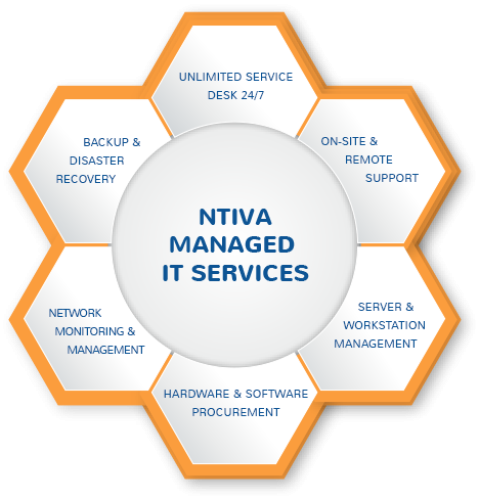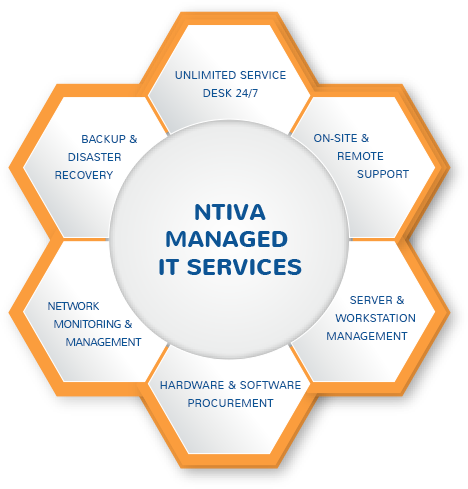
Is Managed IT Services Suitable For Nonprofits?
Is Managed IT Services Suitable for Nonprofits? You might be wondering if your favorite nonprofit organization can benefit from managed IT services. Well, wonder no more! In this article, we'll explore the world of IT services for nonprofits and why they can be a game-changer.
Picture this: a nonprofit organization with limited resources, trying to make a difference in the world. Now, imagine that organization struggling with outdated technology, IT problems, and security breaches. Not a pretty picture, huh? That's where managed IT services come in. They provide expert support, proactive maintenance, and top-notch security, all tailored to meet the unique needs of nonprofits.
But here's the thing: nonprofits have distinct challenges and priorities, so a one-size-fits-all IT solution won't cut it. That's why managed IT services for nonprofits exist. They understand the specific needs and budget constraints that nonprofits face, helping them streamline their operations and focus on what really matters: making a positive impact in the community.
So, whether you're a nonprofit looking to optimize your IT infrastructure or someone interested in the intersection of technology and social impact, stick around. We'll dive deep into why managed IT services are a great fit for nonprofits and how they can unlock new possibilities for these organizations. Get ready to discover the power of technology in creating a better world!

Is Managed IT Services Suitable for Nonprofits?
Nonprofit organizations often face unique challenges when it comes to managing their IT infrastructure. Limited budgets, limited staff, and the need to allocate resources to their mission can make it difficult to prioritize and implement effective technology solutions. However, with the increasing complexity and importance of technology in today's world, nonprofits cannot afford to ignore the benefits of managed IT services. In this article, we will explore whether managed IT services are suitable for nonprofits and how they can help these organizations overcome their IT challenges.
The Benefits of Managed IT Services for Nonprofits
1. Cost Savings: One of the primary benefits of managed IT services for nonprofits is cost savings. By outsourcing their IT needs to a managed service provider, nonprofits can save on the expenses associated with hiring and training an in-house IT team. Managed IT services often operate on a subscription or pay-as-you-go model, allowing nonprofits to have predictable and manageable IT costs.
2. Enhanced Security: Cybersecurity threats pose a significant risk to nonprofits, as they may not have the resources or expertise to adequately protect their sensitive data. Managed IT service providers have the knowledge and tools to implement robust security measures, ensuring that nonprofits' data and systems are protected against cyber attacks.
3. Proactive Monitoring and Maintenance: Nonprofits often do not have the capacity to monitor their IT infrastructure constantly. Managed IT service providers can remotely monitor and maintain nonprofits' systems, identifying and addressing potential issues before they become significant problems. This proactive approach minimizes downtime and keeps nonprofits' operations running smoothly.
Managed IT Services vs. In-House IT Departments
When considering IT support options, nonprofits may wonder whether it is more cost-effective to rely on an in-house IT department or partner with a managed service provider. While both options have their advantages, managed IT services offer several benefits over in-house departments.
1. Cost: As previously mentioned, managed IT services can provide significant cost savings compared to maintaining an in-house IT department. Nonprofits can avoid the expenses of hiring and training IT staff, providing benefits and managing employee turnover.
2. Expertise: Managed IT service providers have specialized expertise and experience in managing IT infrastructure. They stay up-to-date with the latest technology trends and best practices, ensuring that nonprofits benefit from the most efficient and secure solutions.
3. Scalability: Nonprofits often experience fluctuations in their IT needs, such as when they expand their activities or undergo periods of rapid growth. Managed IT services offer the flexibility and scalability to adapt to these changes quickly, providing the necessary support and resources without the need for extensive infrastructure upgrades.
Tips for Nonprofits Considering Managed IT Services
1. Assess Your IT Needs: Before partnering with a managed IT service provider, nonprofits should assess their IT needs and identify their pain points. This assessment helps determine the specific services and level of support required and ensures that the provider can meet those needs.
2. Evaluate the Provider's Experience: It is crucial to research and evaluate the experience of managed IT service providers before making a decision. Look for providers with a track record of working with nonprofits and the ability to understand their unique challenges and requirements.
3. Check for Certifications and Security Measures: Nonprofits handle sensitive donor information and confidential data, so it is essential to prioritize security. Ensure that the managed IT service provider has appropriate certifications and security measures in place to protect your organization's data and systems.
Conclusion
Managed IT services can be highly beneficial for nonprofits, providing cost savings, enhanced security, and proactive IT support. By partnering with a managed service provider, nonprofits can focus on their mission and leave the complexities of IT management to the experts. When considering managed IT services, nonprofits should assess their specific needs, evaluate providers' experience, and prioritize security measures. Choosing the right managed IT service provider can help nonprofits overcome their IT challenges and ensure the smooth operation of their organizations.
Key Takeaways: Is Managed IT Services Suitable for Nonprofits?
- Managed IT services can be beneficial for nonprofits, providing them with professional IT support and expertise.
- Outsourcing IT services allows nonprofits to focus on their core mission and goals.
- Managed IT services offer cost-effective solutions for nonprofits with limited budgets.
- IT service providers can enhance data security and protect against cyber threats for nonprofits.
- Nonprofits can benefit from improved productivity and efficient technology management through managed IT services.
Frequently Asked Questions
Managed IT services can significantly benefit nonprofits by providing them with the technical expertise and support they need to operate efficiently. Here are some common questions nonprofits may have about whether managed IT services are suitable for them, along with their answers:
1. How can managed IT services help my nonprofit organization?
Managed IT services can provide a range of benefits to nonprofit organizations. They can ensure that your IT infrastructure is secure and well-maintained, reducing the risk of cyberattacks and data breaches. Additionally, managed IT services can offer proactive monitoring and troubleshooting, keeping your systems running smoothly and minimizing downtime. They can also provide expert guidance on technology strategy and help you align your IT investments with your organization's goals.
By outsourcing their IT needs to a managed service provider, nonprofits can free up their resources and focus on their core mission. Managed IT services can provide reliable support for your day-to-day technology needs, allowing your staff to work more efficiently and effectively.
2. Are managed IT services affordable for nonprofits?
Managed IT services can be a cost-effective solution for nonprofits. While the cost of managed IT services will vary depending on the specific needs of your organization, outsourcing your IT needs can often be more affordable than hiring and maintaining an in-house IT team. By partnering with a managed service provider, you can benefit from their expertise and economies of scale, as they serve multiple clients and can spread the cost across them.
Additionally, managed IT services can help reduce your IT infrastructure's total cost of ownership by preventing costly downtime and minimizing the need for costly repairs or emergency support. With predictable monthly costs and customizable service packages, managed IT services can be tailored to fit your nonprofit's budget.
3. Can managed IT services customize their solutions to meet our nonprofit's unique needs?
Yes, managed IT service providers can customize their solutions to meet your nonprofit's unique needs. They understand that every nonprofit organization has different technology requirements, and they can tailor their services to align with your mission, goals, and budget. When selecting a managed service provider, it's essential to communicate your specific needs and objectives to ensure they can provide the right solutions for your organization.
Managed IT service providers typically offer a range of services, including network management, cybersecurity, cloud solutions, data backup and recovery, and help desk support. You can work with them to determine which services best meet your organization's needs and develop a customized IT strategy that supports your operations and growth.
4. Will outsourcing IT services to a managed service provider compromise our data security?
No, outsourcing IT services to a reputable managed service provider should not compromise your data security. In fact, managed IT service providers usually have strong expertise in cybersecurity and can provide robust security measures to protect your organization's sensitive data.
Managed service providers employ industry best practices to ensure the confidentiality, integrity, and availability of your data. They can implement security measures such as firewall protection, antivirus software, intrusion detection systems, and data encryption. They can also provide employee training on cybersecurity awareness to minimize the risk of human error. When selecting a managed service provider, it's crucial to choose one with a strong track record in security and compliance.
5. How can managed IT services help us stay up to date with technology trends?
Managed IT service providers can help nonprofit organizations stay up to date with the latest technology trends. They stay well-informed about emerging technologies, industry trends, and best practices, and can provide guidance on how these advancements can benefit your organization.
By partnering with a managed service provider, you can tap into their knowledge and expertise to identify and implement technology solutions that can streamline your operations, enhance collaboration, improve productivity, and better engage with your supporters. They can also help you create a technology roadmap that aligns with your organization's vision and goals, ensuring that you stay ahead in the digital landscape.
Managed Services Solutions | What is Managed IT Services?
Summary
Managed IT services can be a good fit for nonprofits because they offer cost-effective solutions. These services provide expert support for technology needs, allowing organizations to focus on their mission rather than IT challenges. With managed IT services, nonprofits can have access to modern technology and stay updated with the latest security measures, ensuring the safety of their data and operations.
Additionally, managed IT services offer proactive monitoring and maintenance, reducing downtime and preventing potential issues. This allows nonprofits to operate efficiently and effectively without worrying about day-to-day IT problems. Outsourcing IT services also provides access to a team of experts who can help nonprofits develop a strategic technology plan aligned with their goals and resources. By leveraging managed IT services, nonprofits can optimize their technology resources and better serve their communities.
Recent Posts
- How Does GPON Improve Network Efficiency?
- What Are The Advantages Of GPON?
- What Are The Benefits Of IT Outsourcing?
- What's The Deal With Ransomware Attacks?
- Are GPON Providers Widely Available?
- What's GPON's Impact On Bandwidth?
- Why Is Multi-Factor Authentication Important?
- How To Ensure Data Privacy Compliance?
 Blogs
Blogs Infographics
Infographics Videos
Videos Podcasts
Podcasts Case Studies
Case Studies Call For Quote
Call For Quote